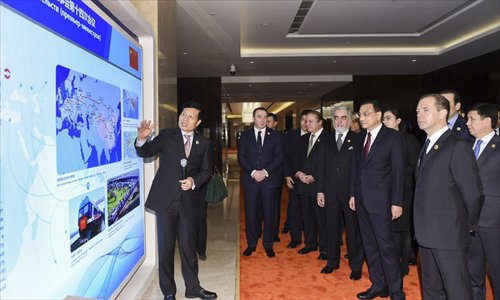SCO meets on security, trade
Gathering responds to economic pressures, terror threat

Chinese Premier Li Keqiang and foreign leaders attending the 14th Shanghai Cooperation Organization (SCO) prime ministers' meeting visit an exhibition on the outcome of cooperation between Henan Province and SCO member countries before a welcome banquet, in Zhengzhou, capital of central China's Henan Province, Dec. 14, 2015. Photo: Xinhua
The prime ministers of the Shanghai Cooperation Organization (SCO) are meeting in Zhengzhou, central China's Henan Province on Monday and Tuesday to discuss upgrading economic and security cooperation and anti-terrorism, a move seen by government officials as a response to economic downturn pressure and the growing threat of terrorism.
Chinese Premier Li Keqiang attended the meeting, which also saw representatives from the SCO's six member states - China, Russia, Kazakhstan, Kyrgyzstan, Tajikistan and Uzbekistan.
Government leaders from Afghanistan, Belarus, India, Iran, Mongolia and Pakistan are also attending as observers.
Unlike the SCO summit, which sets goals and development strategies, the two-day prime ministers' meeting focuses on implementing trade, exchange and security cooperation goals made at the summit. It is considered one of the SCO's key mechanisms.
Hailing the SCO as a model of good neighborliness and win-win cooperation, Li said the organization has always adopted an approach of non-alliance, non-confrontation and non-targeting of third parties in regional and international affairs. This, he said, has contributed to the stability, peace and prosperity of the world.
SCO Secretary-General Dmitry Mezentsev told reporters earlier on Monday that the member countries will review the results of previous trade and economic cooperation, and will draw plans for future cooperation.
"I have every confidence that the joint statement of the heads of the governments will involve projects and activities for the next period, with special attention on multilateral and infrastructure projects in transportation, agriculture, energy, tourism and humanitarian work," Mezentsev said.
They are also expected to sign a host of cooperation deals and SCO internal affairs resolutions, according to Chinese vice-foreign minister Cheng Guoping.
Among the most anticipated is a plan to make customs clearances between member countries much easier between 2016 to 2021 to promote trade within the bloc. The customs document will also allow member countries to share information in combating crimes through customs.
Multiple challenges
"Amid the fragile global economic recovery and downward pressure on many economies, China expects this meeting will help countries match their development strategies, deepen international industrial capacity cooperation and exchange views on regional and international issues of mutual concern," Li said.
The challenges also include growing security threats posed by terrorism. Therefore, the SCO bears a more pressing task of providing security guarantees and boosting economic development for its member states, said Cheng.
Due to the plunge in energy and raw material prices, countries whose economies depend heavily on natural resources such as Russia, Kazakhstan and Uzbekistan are still facing severe economic downturns. Russia has forecast a 3 percent drop in oil exports revenue. The country has revised its economic growth target from 2 to 1 percent in 2016.
"Many SCO member states are abundant in energy resources, and as the world's factory, China needs them to boost its economy. The meeting will encourage the countries to tap into their comparative advantages to upgrade multilateral pragmatic cooperation," Gao Fei, a political scientist at the China Foreign Affairs University, told the Global Times Monday.
The meeting will further discuss details of the "Belt and Road" initiative proposed by Chinese President Xi Jinping and other SCO members' development strategies, especially Russia's Eurasian Economic Union.
Premier Li met his Kazakhstan counterpart Karim Massimov in Beijing on Monday, and witnessed the signing of a dozen deals, including an agreement establishing a $2 billion production cooperation fund.
In the past 12 months, China and Kazakhstan have launched dozens of projects worth about $23 billion.
A number of projects, including automobile, chemical, steel and light-rail projects, have begun or will begin next year, according to Li.
Anti-terrorism cooperation
Mezentsev praised the SCO's efforts in fighting terrorism, saying that regional stability and security are still part of the SCO's priorities, as well as combating the three evil forces, which are separatism, extremism and terrorism.
The SCO member states have held several anti-terrorism drills, including one in North China's Inner Mongolia Autonomous Region in August 2014. A total of 7,000 troops from China, Russia, Kazakhstan, Kyrgyzstan and Tajikistan were sent to the Zhurihe training base in Inner Mongolia to test intelligence sharing and joint counter-terrorism capabilities.
"The SCO is the firewall against terrorism. The organization has prevented terrorism in Western Asia and Afghanistan from penetrating into the member states, which is significant for the world's anti-terrorism cause," Gao said.
Xinhua contributed to this story